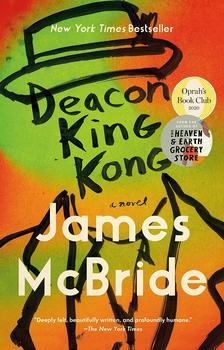Summary | Excerpt | Reviews | Beyond the book | Read-Alikes | Genres & Themes | Author Bio

Cuffy Jasper Lambkin, better known as Sportcoat to his fellow members of the Five Ends Baptist Church and residents of the Causeway Housing Projects in South Brooklyn, is at the heart of James McBride's novel Deacon King Kong. The 71-year-old widower meanders through "The Cause," performing odd jobs when he's not too intoxicated by the local moonshine (which is rarely). He's the person everyone knows, trusts and calls on when they need help, the person who sets all to rights. "There is no job too small, no miracle too wondrous, no smell too noxious," McBride writes.
[I]f your visiting preacher had diabetes and weighed 450 pounds and gorged himself with too much fatback and chicken thighs at the church repast and your congregation needed a man strong enough to help that tractor-trailer-sized wide-body off the toilet seat and out onto the bus back to the Bronx so somebody could lock up the dang church and go home – why, Sportcoat was your man.
Which makes it all the more surprising when this peaceful man beloved by all, out of the blue and without warning, shoots a 19-year-old drug dealer one afternoon at the flagpole where the old church women of the neighborhood congregate to exchange the daily gossip.
The book is to an extent about unraveling the mystery of what led Sportcoat to do such a thing, as well as detailing the consequences the attack sets in motion. Really, though, the plot is at times almost irrelevant, and in fact barely pokes its head up during the first half of the novel, only showing itself briefly now and then to remind readers that there truly is a unifying story here somewhere. The author embeds deeper topics into the overall narrative, taking on issues like the importance of friendship and trust, the need to be loved, the sense of caring that comes from being part of a community, the effect of racial disparities on communities of color and dealing with change.
Primarily, though, McBride seems intent on establishing an atmosphere, conveying the feel of the neighborhood and its residents. Page after page is devoted to character sketches and descriptions of the many tiny facets of life in the Projects. One chapter, for example, is about an annual invasion of ants. This laugh-out-loud account is completely peripheral to the book's storyline, but there's so much color in it, so much vivid detail, that one's mental image of the neighborhood is heightened considerably. Although the novel often feels a bit like a collection of short stories, all the little vignettes add up to an enormously effective portrait of the community as a whole as well as the people that comprise it. When the plot does kick in (somewhere around pages 200 to 250) it's engaging and moves along rapidly, if somewhat improbably.
Although the narrative is set in 1969, the issues it raises haven't changed much in the ensuing decades and seem particularly relevant in light of the current Black Lives Matter movement. Black vs. white racial conflict isn't a major theme — or, rather, it's so all-encompassing that it's more a state of being, an undercurrent humming along just below the surface of the entire story. There's a lot of justifiable anger evident under McBride's humor; as a white reader, there were times when I simultaneously found myself laughing and feeling ashamed of the racial disparities that exist and the privileges I have simply because of my skin color. It says a lot about the author's skill, though, that while the novel deepened my understanding of some of the issues Black communities face and left me thoughtful, it still ended up being a feel-good read that had me smiling at the end.
Comedy can be tricky to pin down; something one person finds amusing might leave another completely unaffected. Personally, I found Deacon King Kong to be one of the funniest books I've read (and typically I don't "get" a lot of what's billed as humor). I did think that at times the comic passages went on too long, and around the middle of the novel I found myself wishing the author would just get on with the story. Although these passages are quite entertaining, for the most part they do little to further the plot and I became a bit bored with the style. However, the narrative soon kicked into high gear and I was completely engaged from that point until the book's end.
Deacon King Kong has appeared on numerous "best of" lists (including BookBrowse's), and it's definitely a worthy entry; it has my vote for one of the best books of the year, at any rate. I highly recommend it to those looking for an exceptionally well-written, light-hearted take on serious subjects. Book groups will likely find many great topics of discussion here.
![]() This review was originally published in The BookBrowse Review in December 2020, and has been updated for the
April 2021 edition.
Click here to go to this issue.
This review was originally published in The BookBrowse Review in December 2020, and has been updated for the
April 2021 edition.
Click here to go to this issue.

If you liked Deacon King Kong, try these:

by Daniel M. Lavery
Published 2025
From the New York Times bestselling author and advice columnist, a poignant and funny debut novel about the residents of a women's hotel in 1960s New York City.

The Heaven & Earth Grocery Store
by James McBride
Published 2025
From James McBride, author of the bestselling Oprah's Book Club pick Deacon King Kong and the National Book Award–winning The Good Lord Bird, a novel about small-town secrets and the people who keep them.
Your guide toexceptional books
BookBrowse seeks out and recommends the best in contemporary fiction and nonfiction—books that not only engage and entertain but also deepen our understanding of ourselves and the world around us.